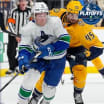There exist few moments of perfect, startling clarity in hockey.
It is late in overtime against the St. Louis Blues when Elias Pettersson receives the puck in his own end, a pass from behind his goal landing right on the tape.
Botchford Project - Building a Leader

By
Sarah Guiney @sleeplesshockey / Vancouver Canucks
This has not been a five minutes devoid of scoring chances, yet something feels different when he gains possession now. Something in the air seems to shift, and as he arcs back around towards goal, it is evident in his teammates' posture on the bench.
Every last one of them is on their feet, their eyes locked on him. As he advances, they lean forward almost as one; watching, waiting, for what they now know is coming next.
And Pettersson, ever composed in the big moments, does not disappoint.
Skating the puck the full length of the ice, his speed beats one, two, three Blues players before he wires a wicked wrist shot home, sealing his third overtime winner of the season. The team pours off the bench to celebrate, but even before they reach him, a single truth has become resoundingly clear:
He has them.
Out on the ice, with the game in the balance, the players look to him.
He has them.
There exist few moments of perfect, startling clarity in hockey, but Pettersson seems to be making a habit of dealing in them.
--
Long before this season tilted into a leadership overhaul-before freshly minted letters on chests, coaches and captains changed and traded away-there was Pettersson, there was Quinn Hughes, and there was a plan.
A plan to step up as leaders, regardless of what that might entail.
In many ways, it was a plot born out of sheer necessity. Both had ended the previous season in blistering form, riding the team's so-called 'Boudreau Bump' down the stretch, yet they'd fallen short of a playoff berth once again. Finding the result unacceptable, they went searching for what more, what else, they could contribute.
But where did they land, exactly?
"I mean, I'm obviously always trying to get better every year," Pettersson began, eager to establish this as his top priority. "I think for both me and Quinn, we're not rookies anymore, and I think we're ready to take that next step and be leaders. Maybe neither of us are the most vocal guys, but just like, take more responsibility and act more mature."
There can be little argument they've done exactly that, quick to justify the letter 'A' stitched onto their jerseys. They conduct themselves in an undeniably more mature manner now, both on and off the ice, and the excellence of their play is surpassed only by the consistency of their performances.
In Pettersson's case, it's hard-fought progress.
The beats of his story are familiar by now. From the highs of his electric rookie debut and the Covid-season playoffs, to the lows of his wrist injury and his underwhelming return, it's been a tumultuous career to date. Now that he's bounced back, that struggle for form has faded to a mere blip on the horizon-a chapter barely worth mentioning, except to provide contrast for his current play.
But for Pettersson, the story runs a little differently. For him, the experience was nothing short of foundational, shaping him into the kind of player-and leader-he still strives to be today.
"Last season was important for me," he confirmed. "I prepared myself as good as I could and then just didn't have the start that I wanted. I didn't have the confidence."
A naturally gifted player, he'd always been able to rely on his hockey skills when faced with setbacks. The knock to his confidence, however, had proven detrimental on that front.
So instead, Pettersson fell back on his work ethic.
Determined to claw his way back, he shrugged off any excuses that were offered up and simply got to work. It was a long and arduous grind, and there was rarely anything pretty about it, but to him, that was the whole point.
"What I want to take out of [the season] is I learned how to get out of the slump by myself," he said. "[I learned] how to find the confidence again and eventually find my game. And now I have found my game, I know what I need to do before a game to feel good, how to play at my best every game-or try to play my best.
"It was good I had a little slump, because after that I really found, I guess, my true self, and how I want to play all the time."
His 'true self' is currently enjoying a breakout season, to the tune of maintaining a 100-plus point pace, chasing down franchise records, and cementing his status as one of the league's elite two-way centres. But as much as his runaway performances inspire in their own right, lifting his teammates and dragging them into the game, his influence does not end there.
Leading by example is far from a passive process-it demands intention, forethought, and discipline, and it's in this area where he has begun to excel. He consistently shows up and works hard, regardless of where his game is at, because he's learned how to get the most out of himself. He knows now that if he only prepares properly, if he follows his routines, then there can be no challenge too great for him to conquer.
And then, armed with this unshakeable confidence, he helps his team.
Whenever Pettersson has identified a team need or deficit this year, he has put himself forward for the task, before doggedly pursuing the required improvements to his game. From the troubled penalty kill and problems on the back end, to blocking shots and-most recently-improving on the faceoff dot, he has actively added to his own game in order to fill the gaps.
He built himself into a leader, because they needed him to.
Now, they need him to speak up.
--
Pettersson has made no secret of his naturally quiet and shy demeanour, often flagging his need to be more outspoken-a sentiment echoed by head coach Rick Tocchet, amongst others.
It's not difficult to see why: he perfectly exemplifies what Tocchet's Canucks strive to be, in terms of hard work, structure, and accountability. Add to the mix his hockey IQ, his insatiable drive to win, and the way he overcame his slump, and his contributions could surely only benefit the room.
For his part, Pettersson believes that he's now better equipped to step up and "just try to help out any way I can" if teammates are ever struggling with confidence. Drawing on his own firsthand experience, his advice would be simple.
"It sounds silly, but: 'don't think and just play.' It was just too much in my head, I was just thinking too much. And when you think too much on the ice, the play has already happened. So, you've just got to react and play, not think. Just trust your instincts."
Perhaps this wisdom could also be applied to his becoming more vocal; despite his repeated concerns, it seems he already has good instincts for where his input could be most helpful.
Consider, for example, his thoughts on training camp. From day one, he was placed in a group comprised largely of rookie forwards with no NHL experience, as well as two new acquisitions-and his soon-to-be wingers-in Ilya Mikheyev and Andrei Kuzmenko. This was a clear step up in responsibility for him, and he appeared to embrace it as such; after each huddle, he could be seen ensuring that his new linemates, hindered by a language barrier, understood exactly what was being asked of them.
Yet this was not his sole takeaway.
"For me, it was just welcoming them to the Canucks and make sure they get comfortable with everything," he revealed. "You know, on the ice we feel comfortable, but anything off the ice, I was just making sure they can ask me or any of the other guys who've been here."
He clearly has a strong foundation of caring for his teammates, but how does he make those instincts translate? How does he 'react … not think?'
Pettersson is still parsing it out.
"On the bench I get so emotional and into the game, so it just happens and I say some stuff on the bench," he explained. "But in the locker room … I guess it will come over time. I think previous years, it's just been nervous about messing up with the language … it hasn't come natural to me to speak up in a room full of guys. I've said some stuff here and there, but I still want to [improve].
"I've never been a captain, so it's like I never really had to talk to the room. It's nothing I'm afraid of, but it's just … I need to realize it's not as bad as I think it is."
Finding a way to push beyond his comfort zone certainly won't be easy, but he's already laid ample groundwork. It's new for him, and it's different-but so, too, were his other goals at some point. What's important is that he's dedicated to trying, and Pettersson confirms as much: he's not backing down.
He's just sizing up the challenge.
As far as examples go, it's the sort that can bring an entire bench to their feet.
--
By its very nature, leadership will always remain a contentious topic in the NHL, inviting all manner of strongly-held viewpoints from spectators and participants alike. In the midst of something so subjective, then, perhaps the element holding the most weight is the opinion of the subject.
When all is said and done, who does Pettersson want to be?
"I want to be known as a guy who always works hard," he answered, with barely a moment's hesitation. "I'm always going to give my best every game. And obviously I want to be a good teammate, who cares about everyone."
This is the Elias Pettersson his teammates know. It is the player we watch out on the ice each night, dazzled by his thrilling dekes and his unceasing drive. And it is the man who worked his way through the toughest obstacle of his career to date, then found it within himself to look back with something like gratitude-because it made him better able to help his team win.
There will always be more challenges, and other roadblocks will surely rise up along the way. But he has proven that he will always choose the fight, secure in the knowledge that as long as his team needs him to, he can-and will-overcome.
On this, there exists nothing but perfect, startling clarity.


















